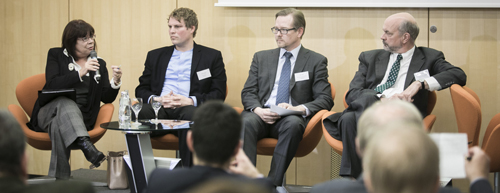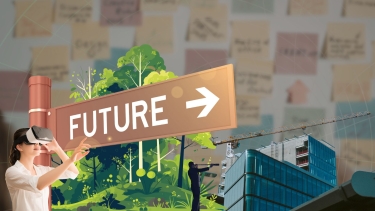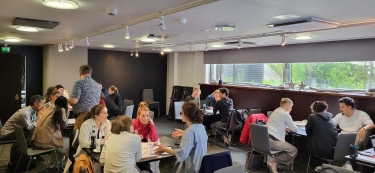Building a pro-active relationship between the economy and ecology
The opportunities which the circular bioeconomy can offer for inclusive, sustainable, economic development were the focus of a ThinkForest seminar on European bioeconomy strategy, which took place in Berlin on 10 May.
Not overusing the biosphere, but also not underusing its potential was the key message. The need for more policy coherence and cross-disciplinary research to inform policy processes was also emphasized. These will be key to building a successful circular bioeconomy strategy for Europe.
Dr Hermann Onko Aeikens, State Secretary from the German Federal Ministry of Food and Agriculture emphasised to participants that forestry is a vital part of the bioeconomy, and that “a sustainable bioeconomy is not possible without sustainable forest management.” He also stated that European Forest Institute enjoys an excellent reputation in Europe and beyond. “Over the past years the Federal Ministry of Agriculture has thus intensified its cooperation with the EFI as an influential, international institution with expertise in forestry.”
Marc Palahí, Director of EFI, said that “bioeconomy and biodiversity should be seen as the two sides of the same coin. Biodiversity is fundamental to ensure a sustainable bioeconomy, based on resilient biological resources and ecosystems, and the long-term investments in bioeconomy can enhance biodiversity. He pointed out that the use of biological resources provides better opportunities for sustainable inclusive growth than fossil-based resources. The EU alone has 16 million private forest owners, and Member States (and their citizens) own 1/3 of the forest area.

Panellists and the audience discussed plans for a revised EU bioeconomy strategy that would connect it to circular economy and help to shape the transition to a more sustainable consumption and production in the EU. It was also stressed that circular bioeconomy plays key role in movement to climate smart and sustainable cities, along with the already well understood role it has in rural areas. Policy coherence and synergies are required between EU, national and regional strategies. This will need a holistic approach, moving out of silos to have cooperation between policymakers and across industries.
The circular bioeconomy is a major opportunity for innovation, investment and new technologies, reminded ThinkForest President Göran Persson. Bold initiatives are needed, and business needs to take up the challenge, so we can move from the first phase of R&D and political discussion to implementation. It is the task for the EU and national parliaments to encourage this process.
Further information
Lauri Hetemäki, Assistant Director, European Forest Institute, e-mail: lauri.hetemaki efi.int or phone: +358 (0)10 773 4316
The ThinkForest event ‘Leading the way to a new European bioeconomy strategy’ was jointly organized by EFI and the Federal Ministry of Food and Agriculture (BMEL) in Berlin on 10 May 2017. The event was chaired by ThinkForest President Göran Persson.
Background information
ThinkForest is facilitated by the European Forest Institute, an independent, science-based international organization. ThinkForest is a high-level discussion forum which brings together policy makers, the scientific community and stakeholders, building bridges on pan-European forest and bioeconomy issues. Since 2012, 17 events have been held, attended by over 1,000 people.
Photos: Florian Gaertner


